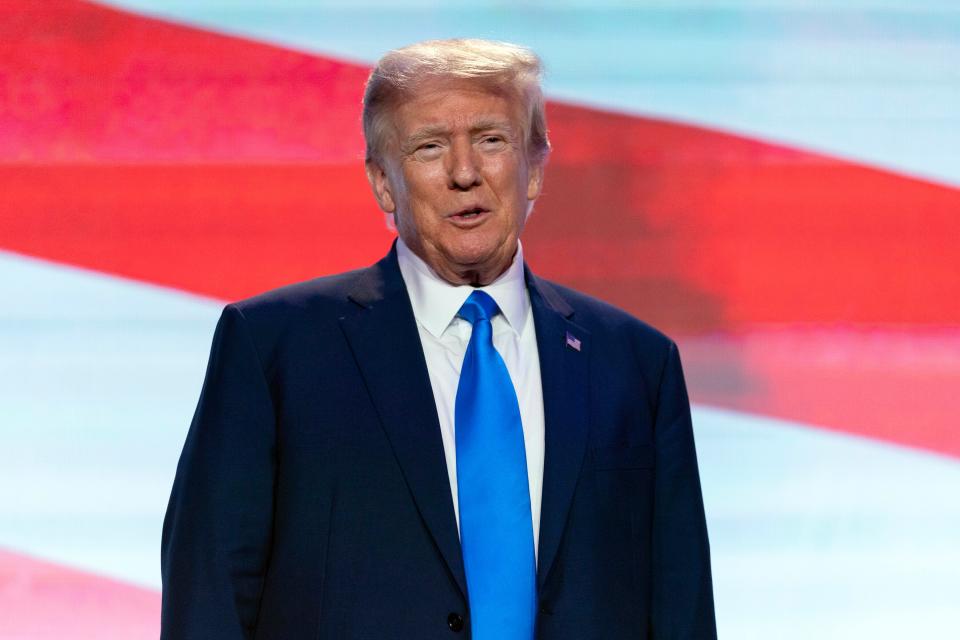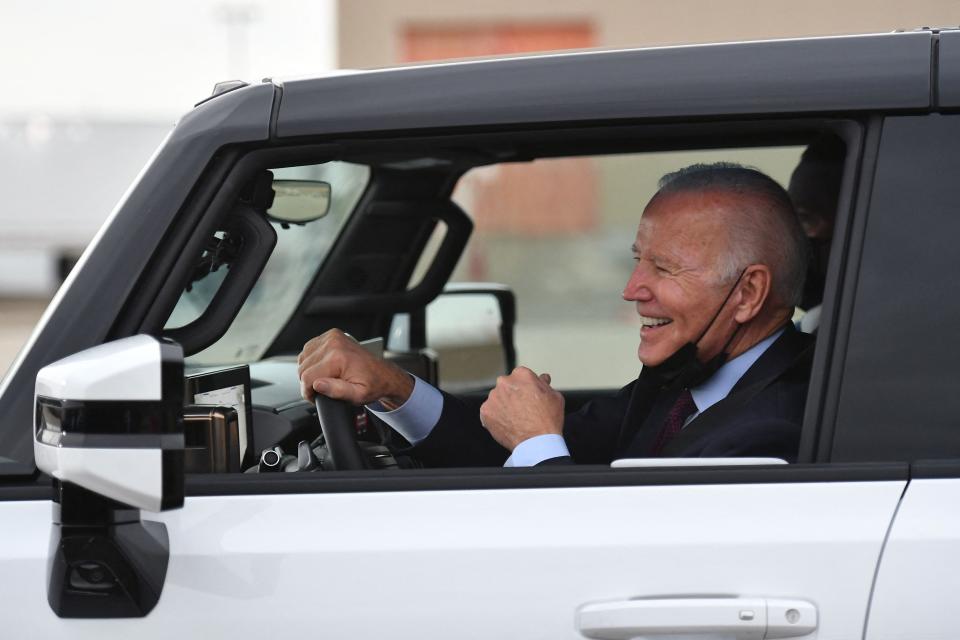WASHINGTON – President Joe Biden and Donald Trump head to Michigan in back-to-back days this week, previewing a fight for working-class voters in the 2024 election as the United Auto Workers continues its strike against the nation’s three largest auto companies.
Their trips, which come nearly two weeks into UAW’s strike at plants operated by Ford Motor Co., General Motors and Stellantis, reflect dramatically different ways Biden and Trump hope to win support of blue-collar voters who could swing Michigan and other Midwest states.
In an extraordinary move for a sitting president, Biden will join the picket line Tuesday with UAW workers in Detroit, backing the union’s demands for higher pay, as he flexes the Democratic Party’s ties with organized labor.
“It’s unprecedented. This has never happened before,” said Erik Loomis, a labor historian at the University of Rhode Island. “For all of the history between the Democrats and unions, FDR certainly wasn’t going to show up on a picket line. Harry Truman wasn’t going to. JFK wasn’t going to.”
On Wednesday night, Trump – the former president and frontrunner to win the 2024 Republican nomination – will hold a rally with current and former union members in Clinton Township, Mich. He will try to speak past UAW’s leadership, led by president Shawn Fain, who has warned his members about Trump and his “billionaire class.”
Unlike Biden, Trump won’t be walking a picket line. He’s instead warned of a new enemy of the working class – electric vehicles, embraced by the Biden administration and a source of consternation among auto workers. Trump argues electric vehicles will be built primarily in China and decimate the U.S. auto industry.
“His approach is to appeal directly to working-class people who feel vulnerable to new technologies and who are vulnerable in the modern economy,” said Ken Kollman, political science professor at the University of Michigan. “He plays on their fears. The idea is I can speak directly to these people and not through their union representatives.”
The voters who could decide Michigan and other Midwest states
Working-class voters who lack college degrees could decide whether Biden again wins Michigan and its 16 electoral votes in 2024 or whether Trump, if he’s the Republican nominee, moves it back to the Republican column.
Trump broke Democrats’ Midwest blue wall in 2016, winning Michigan, Wisconsin and Pennsylvania, by deepening Republican support with white, non-college educated voters and making inroads with a key Democratic constituency: union voters.
Rep. Debbie Dingell, D-Mich., saw it coming, warning her fellow Democrats weeks before the 2016 election that Trump’s anti-trade message was resonating with auto workers and could cost Hillary Clinton her state.
“I said it because I was in those union halls,” said Dingell, whose district is blocks away from a Ford plant where the United Auto Workers have been on strike since Sept. 15. “We will not make that mistake again.”
In 2020, Biden reclaimed Michigan, Wisconsin and Pennsylvania for Democrats in part by improving on Clinton’s performance with union voters. Biden received votes from about six in 10 union members, according to the Associated Press’ Vote Cast, a sizeable difference but not an overwhelming margin despite Biden having the endorsements of UAW and other labor unions in the 2020 election.
Trump’s efforts to win Michigan back would be boosted if he can again chip into Democrats’ historic advantage with union voters.
“There’s a potential opening because the education divide has made union households more open to competition from Republicans than it had been historically,” said Matt Grossman, director of the Institute for Public Policy and Social Research at Michigan State University.
But Grossman said Trump’s appeal to union workers in 2024 is problematic because his rhetoric doesn’t match the policy agenda of unions at a time when organized labor is enjoying its most popularity in decades. Sixty-seven percent of Americans approve of unions, a Gallup poll found in August, up from 56% in 2016.
“Trump is perfectly willing to say, ‘Biden screwed over the UAW.’ But he doesn’t seem like he’s saying the other part, which is ‘I’m going to be fully supportive,'” Grossman said.
Why Biden decided to make history by joining picket line
Biden’s picket-line appearance is not without risk. He has decades of close ties with organized labor and said he wants to be known as the “most pro-union president” in U.S history. Yet Biden also wants to avoid national economic repercussions that could result from a prolonged strike due to lost wages for UAW workers and auto suppliers and the auto industry’s financial losses.
After announcing plans to ratchet up the strike to 38 additional sites across 20 states, Fain publicly invited Biden to join workers on the picket line.
Fain’s invitation added to mounting pressure for Biden to visit UAW strikers after Sen. John Fetterman, D-Pa. House Democratic Leader Hakeem Jeffries and progressive independent Sen. Bernie Sanders of Vermont each made trips to striking sites.
“What we need to do is to clearly be the working-class party,” said Rep. Ro Khanna, D-Calif., who had urged the president to make the trip.
Biden committed last Friday after Trump already announced his visit days before.
White House press secretary Karine Jean-Pierre said Trump’s visit did not influence Biden’s decision to join the picket line. “Absolutely not,” she said Monday, adding that Biden wants to “stand with auto workers.”
At the request of UAW leadership, Biden has stayed out of negotiations between the union auto companies yet made clear he’s on the side of UAW workers, arguing they deserve a “fair share” from “record corporate profits” of the automakers.
UAW wants 40% pay raises for auto workers, a four-day work week, the elimination of a multi-tiered wage system and the restoration of a pension plan. Even though Biden will join UAW workers in Michigan, Jean-Pierre would not say whether he wants the auto companies to agree to the union’s preferred terms.
“He believes that corporate profits should lead to a record UAW contract,” she said. “They’re going to negotiate what that looks like for them.”
More: UAW files complaint against Sen. Tim Scott alleging that he violated federal labor law
Trump’s war on electric vehicles
Fain said the union has made “some real progress” with Ford Motor Co. – including eliminating a wage tier and reinstating cost-of-living pay increases – but General Motors and Stellantis “need some pushing.”
Largely ignoring the union’s demands, Trump has seized on anxieties about the proliferation of electric vehicles, which Biden has supported through incentives as part of his climate agenda. Trump has warned electric vehicles, which generally require fewer workers to build than traditional cars, has put their careers at risk.
“All those cars are going to be made in China. Every one of them. You can forget it, Michigan,” Trump said last month. “You can’t listen to these union guys who get paid a lot of money and they get wined and dined in Washington. They know that electric cars are no good in terms of our workers.”
Biden has made clear that he wants “good-pay union jobs” at electric-vehicle plants of the future as he pushes a goal to make zero-emissions vehicles to account for half of all automobiles sold in the U.S. by 2030

Fain has said repeatedly the UAW supports Biden’s push for electric vehicles. But the union was furious after the Department of Energy in June awarded a $9.2 billion grant to Ford and a South Korean battery maker that lacked assurances UAW sought for workers.
UAW is holding off on 2024 presidential endorsements after backing Biden in 2020. Fain told CBS’ Face the Nation that the union’s endorsement must be “earned” and that, “We expect action, not words.”
Still, UAW applauded $15.5 billion in federal grants and loans announced in August to help retrofit and retool existing automotive facilities so they can build electric vehicles and batteries. The Biden administration is prioritizing projects that retain collective-bargaining agreements with auto workers.
The Biden campaign and Democratic allies say they’re confident Trump’s trip won’t have the impact the former president wants because of Trump’s “anti-worker” record in the White House – including passing tax cuts for corporations and high-income earners in 2017.
Marick Masters, a business professor at Wayne State University and director of the school’s Labor@Wayne program, said Trump’s crusade against electric vehicles is intended to go “over the heads of the union leadership directly to the rank and file where he does have a base of support.”
But he questioned whether Trump’s message – that electric vehicles pose an “existential threat” to the auto industry – will bring back enough voters he lost in 2020 to replicate Trump’s 2016 election formula.
“Unless this strike were to backfire on the UAW and really have a negative impact,” Masters added. “Then I think the blame is going to be put on parties that contributed to what they consider to be the demise of the industry.”

Reach Joey Garrison on X, formerly known as Twitter, @joeygarrison.
This article originally appeared on USA TODAY: Biden, Trump to visit Michigan in a fight for the working class







